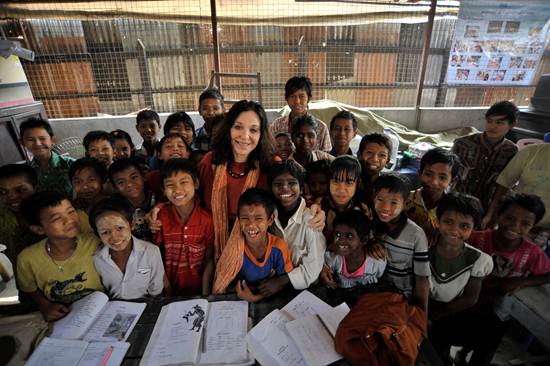As the founder of development and children's rights organization FXB International, I have in the past several years witnessed a subtle yet important shift in the terms used to describe our work, as "international health" has steadily faded away in favor of "global health." This shift is a perfect representation of the ways in which modern life has shrunk the size of our world and expanded the reach of our connections -- we are no longer "international," defined by our borders, but rather "global," defined by what we share across them.
Unfortunately, one of the most troubling things we share is a global epidemic of poverty compounded by HIV/AIDs. This epidemic has created a generation of children left desperately poor and vulnerable, left by neglectful governments without access to healthcare, education or hope for the future. And just as it encompasses a wide-ranging host of problems -- in medicine, in economics, in infrastructure -- so too must its solution be global in scope.
No one understood this better than Dr. Jonathan Mann, a figure who believed deeply in the importance of holistic solutions. As the founder of the World Health Organization's Global Program on AIDS in 1986, Mann pioneered the idea that health and human rights are inextricably linked, arguing that public health interventions can be sustained only by ensuring people access to the essential rights and services that all deserve.
The central program of FXB International, the FXB-Village Model, is a solution firmly rooted in the concept of interconnectedness -- and so it should come as no surprise that when I founded the program in 1989, I did so with Mann's public health paradigm in mind. With thousands of children orphaned by HIV/AIDS living with extended and foster families -- and many of those households headed by struggling widows or grandparents -- the well-being of the world's most vulnerable children is intimately tied to the well-being of the adults around them. The FXB-Village Model, therefore, operates on a holistic view of children's rights. We help children by investing in their families and communities, empowering participants to permanently lift themselves out of poverty.

Albina du Boisrouvray with children from the FXB Sunday Empowerment Group in Yangon, Myanmar. Courtesy of Kaung Htet
In a field flush with development and aid programs, the FXB-Village Model is unique in its view towards long-term results, emphasizing sustainability over handouts. The structure is as simple as it is effective: In the first year, participating communities are provided essential services at no cost, including healthcare, children's education, food, sanitation, psychosocial counseling and vocational training. In the second, participants' financial contribution towards their households increases to 25 percent as they build on their newfound knowledge and skills. In the third, that figure increases to 50 percent as they work towards achieving financial autonomy, and by the end of the final year, participants graduate with the expectation that they are now fully self-sufficient. According to a recently published Harvard study The Cost of Inaction, fully 70 percent of them remain so for life, with that number increasing to more than 80 percent if food produced by the families in rural areas is included in the analysis.
Since the first FXB-Village Model initiative was founded in Uganda nearly 25 years ago, the program has flourished along with the people it serves, expanding to its current reach of 49 locations across Africa, Asia and South America. We've helped 12,000 families and more than 800,000 children to date by focusing our efforts on those who care for them -- people like Elizabeth, a mother in Rwanda whose family was left in poverty when her husband passed away soon after the birth of her children.
Struggling with depression and other health problems, unable to pay for food, shelter or education for her children, Elizabeth faced what appeared to be a hopeless future until the day an FXB staffer knocked on her door. Today, with the help of counseling, nutritional support and her own pig as a means of generating income, Elizabeth has successfully overcome a difficult past to provide her children with a brighter future.
The future of the FXB-Village Model is equally bright. The program's accomplishments are due in no small part to another by-product of our increasingly connected world - a strengthened commitment to empowering all communities to make the best decisions for their future. As FXB moves further into the 21st century, we are transitioning from a centralized structure to a localized decision-making model, empowering local boards to act autonomously within their communities. This shift will enable staff members to tailor initiatives to each village's cultural and economic realities and help the FXB-Village Model expand the depth of its programming for continued success.
But true to its founding philosophy, the FXB-Village Model has not achieved such success in a vacuum. We are both connected to and indebted to others in the fields of development and global health -- others like Dr. Jonathan Mann; like Cost of Inaction study author Dr. Sudhir Anand; like Nobel Laureate Amartya Sen, Anand's advisor in the study and author of its foreword; and like our Global Partners, companies and private donors that have committed themselves to raising funds for the FXB-Villages Model through grassroots campaigns. As the FXB-Village Model continues to grow and we develop ways to share its methodology with the public, we will continue to rely on others - on organizations that put out the call to action, and on individuals that answer it - to help us validate and advance our work. With the ills of poverty and disease impacting the security of our global future, only a truly global effort will be able to heal our world.